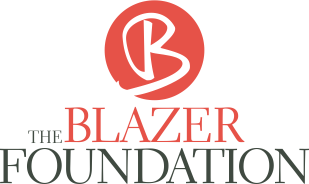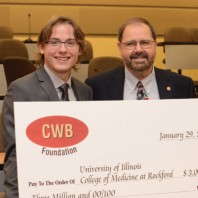Potentially life-changing research to aid people with debilitating injuries or diseases will begin at the University of Illinois College of Medicine at Rockford thanks to a $3 million grant announced Tuesday, Jan. 29, 2013. The donation, the largest in the college’s history, was made by the CWB Foundation to establish a center to specialize in the emerging science of cell regeneration.
University of Illinois President Robert Easter said the gift, which will be matched dollar for dollar by the university, will enable the college to “bring in top researchers who will partner with our experts in medicine, technology and other fields to pursue breakthroughs to improve the lives of people with disabilities.”
The CWB Foundation honors the memory of the late Cedric W. Blazer, former president of Rockford’s Zenith Cutter Co. Blazer’s son, Mark, who presented a check for the donation, called it an “exceptional” way to commemorate his father, who was a champion for persons with disabilities. Cell regeneration research seeks an understanding of how human cells create and renew themselves and focuses on attempting to cure or ease the suffering of persons afflicted by heart disease, cancer, Alzheimer’s and Parkinson’s diseases, diabetes and spinal cord injuries.
Dean of the University of Illinois College of Medicine Dr. Dimitri Azar said the college will recruit a senior scientist as the Cedric W. Blazer Professor for cell regeneration research. That scientist also will serve as director of the research program. Another scientist will be recruited as the Michael A. Werckle MD Professor to partner with the senior scientist in the program. Dr. Werckle, who was a close friend to Blazer, called the donation a fitting memorial to Blazer.
“Cedric, No. 1, wanted to help Rockford,” Dr. Werckle said. “He was a very strong advocate of the community and he was a strong advocate of the disabled and the handicapped.” He called the donation an expansion of the work Blazer did during his life. He also said a professorship in one’s name is “the biggest honor for someone dedicated to medicine.”
Dr. Azar also said the college will form two research teams to focus on tissue engineering as a means of improving or replacing biological functions for the disabled and will develop a regenerative medicine curriculum and educational program “to engage young scientists and build a forward-thinking academic collaboration to expand the work in this field and ultimately lead to life-changing discoveries for our patients.”
He said meetings to begin laying out parameters for recruiting the scientists were scheduled immediately following the donation announcement.

